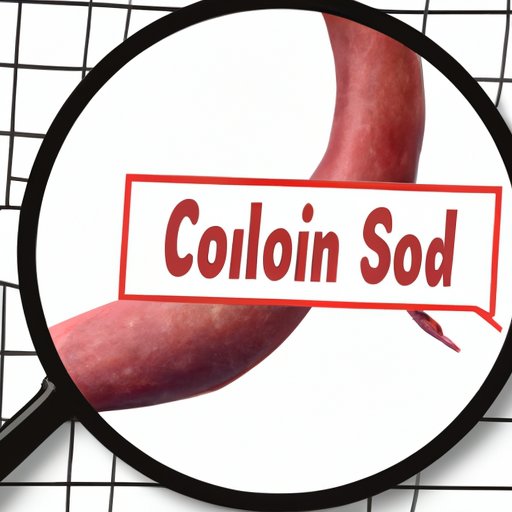
I. Introduction
Colonoscopies are essential procedures that help prevent colon cancer. Still, to ensure a successful colonoscopy, one must prepare adequately for the procedure. Without proper preparation, the likelihood of complications increases significantly.
In this article, we’ll share with you everything you need to know about prepping for a colonoscopy. From the step-by-step guide on how to prepare for the procedure to tips on how to make the preparation process as comfortable as possible, we’ve got your back.
II. Why Colonoscopies Are Important
A colonoscopy is a medical procedure that allows healthcare professionals to examine the colon and rectum for any abnormalities, such as polyps. Colonoscopies are essential for maintaining one’s health because they help detect any signs of colon cancer. Colon cancer is the third most common type of cancer in the United States, with more than 100,000 new cases diagnosed each year.
The benefits of getting a colonoscopy are enormous. Colonoscopies can help prevent colon cancer by detecting any precancerous growths before they become cancerous. Moreover, the procedure gives your doctor the chance to check for any other colon-related issues and perform any necessary treatments.
III. Preparing for a Colonoscopy
Colonoscopies require a thorough preparation process. Patients need to follow specific guidelines to ensure the best possible procedure. The following is a step-by-step guide to prepping for your colonoscopy, starting at least a week before the procedure:
- Discuss with your healthcare provider the procedure and any preparation instructions you should be aware of
- Adjust your diet a week before the procedure and reduce your fiber intake.
- You don’t have to go on a liquid diet, but you should avoid high-fiber and fresh fruit products, such as nuts, seeds, vegetables, whole grains, and raw fruits.
- If prescribed, you may have to start your bowel preparation medication a few days before your colonoscopy.
- You may also receive additional instructions from your doctor or healthcare provider on how to prepare at home.
- Make sure you have someone available to drive you home after the procedure, as the effects of sedative medications can last several hours.
During the preparation process, you’ll need to cleanse your colon. There are different ways to do this, such as taking laxatives, enemas, or a prescription colon prep solution. Your doctor or healthcare provider will guide and advise you on which option is best for you.
Additionally, you’ll need to follow dietary restrictions, such as avoiding solid foods and consuming only clear liquids like water, clear broths, and coffee throughout the prep process. You’ll also need to avoid red and blue liquids and drinks that contain red or purple dye.
IV. Tips for Making Preparation Easier
Preparing for a colonoscopy can be challenging, but there are ways to make it more comfortable for you. Here are some tips that can help:
- Stay hydrated throughout the preparation process by drinking clear liquids and water.
- Avoid any stressful or strenuous activities as much as possible.
- Wear comfortable clothing and stay close to the bathroom.
- You might experience uncomfortable thirst and hunger symptoms, but remember that these feelings will go away after the procedure.
- If you’re experiencing some discomfort during the preparation process, you can use over-the-counter pain medication such as acetaminophen to relieve pain.
- Ask your healthcare provider if they can provide you an anti-nausea medication prescription to deal with the nausea associated with some of the colon prep solutions.
- Recruit a friend or family member to help you throughout the process.
V. Common Concerns and How to Address Them
Going in for a colonoscopy can be scary, but it’s essential to put your fear aside and focus on the positive aspects of the procedure, such as the preventative benefits. Below are some common concerns and how to address them:
- Pain: Colonoscopies are usually painless, but you might experience some discomfort during the procedure. However, you’ll be under mild sedation to help you relax and minimize any discomfort.
- Embarrassment: During the procedure, you’ll wear a gown that keeps your body covered, and your healthcare provider will respect your privacy and will keep you comfortable throughout the procedure.
- Complications: Although possible, complications from colonoscopies are rare. However, if any, they include bleeding, perforation, and bowel infection.
VI. The Day of the Procedure
On the day of the procedure, you’ll arrive at the hospital or clinic, and the healthcare provider will prep you for the procedure. The procedure itself will require you to be under mild sedation. During this time, the healthcare provider will insert a thin, flexible tube into your anus and through your rectum to your colon. The tube will have a small camera attached to it, giving the healthcare provider a clear view of your colon and allowing him to detect any abnormalities.
After the procedure, you might experience mild side effects such as cramping, bloating, and gas, but these side effects will generally subside fairly quickly. You might also notice that you’ll need to use the bathroom. It’s essential to take it easy and focus on rest and recovery. You may have a reflex or belch out some air, but this should pass soon. The following day you should be able to resume your regular routine.
VII. Conclusion
Prepping for a colonoscopy can seem daunting, but with the necessary steps in place, you can have a comfortable and safe procedure. The pre-procedure process involves a step-by-step guide, specific dietary restrictions, and colon prep solutions, among others. By following our tips and making sure you have enough support and care from your loved ones and healthcare providers, you’ll increase your likelihood of having a successful colonoscopy. Don’t forget that colonoscopies are crucial for preventing colon cancer, and early detection is key to recovery. So, don’t hesitate to book your appointment and take care of your health.





